If you’re a cat owner, there’s a good chance you’ve wondered about this very question. Do cats bleed before giving birth? What should you do if your cat is giving birth?
In this blog post, we’ll take a look at what happens during cat labor and delivery, as well as how to tell when your cat is ready to give birth.
Key Takeaway
- While it is not typical for cats to bleed before giving birth, a small amount of blood-tinged discharge or “spotting” from the vagina can be normal just before or during labor, but any significant bleeding should be considered abnormal and warrants immediate veterinary attention.
- The stages of labor in a cat involve initial behavioral and physical changes (Stage 1), the start of contractions (Stage 2), the delivery of kittens (Stage 3), and the expulsion of the afterbirth (Stage 4).
- A pregnant cat may bleed but not deliver kittens due to reasons such as early contractions, death of a fetus, hormonal issues, bacterial or viral infections, or even medical emergencies like hemorrhaging.
Do Cats Bleed Before Giving Birth?
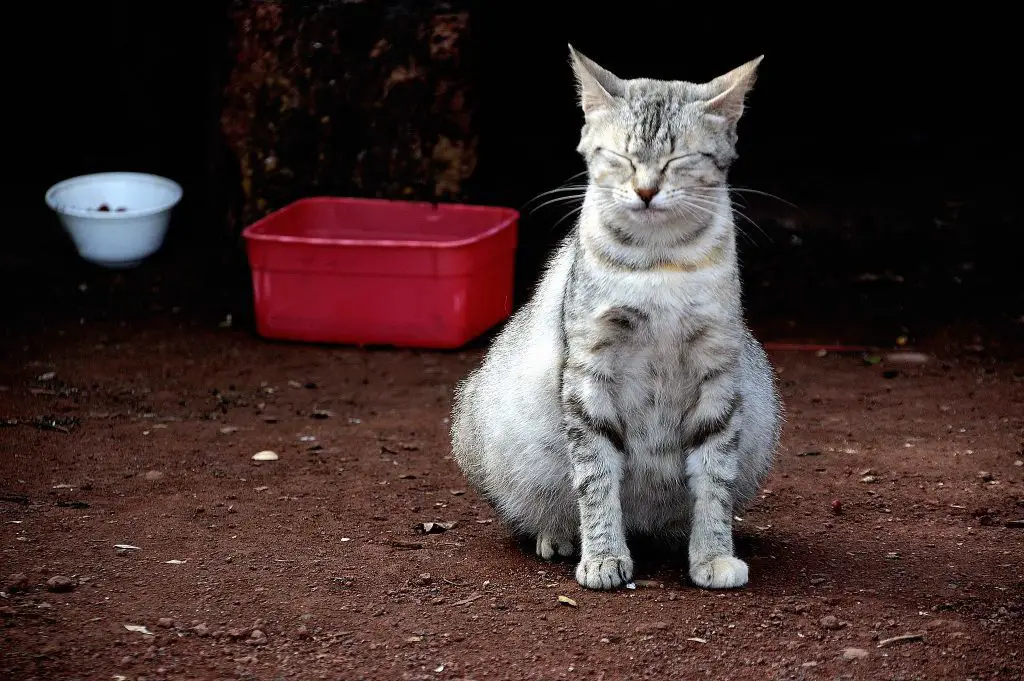
Cats typically do not bleed before giving birth, and if bleeding is observed, it could indicate a problem that requires immediate veterinary attention.
As a veterinarian, I can share that the normal birthing process in cats, also known as queening, usually does not involve noticeable bleeding.
Cats will go through several stages of labor, starting with nesting behavior, followed by a period of restlessness and panting, and finally active labor where the kittens are born.
Some cats may pass a small amount of mucus or a discharge from their vulva prior to giving birth, but this should not be bloody.
If a pregnant cat is observed to be bleeding from the vulva, it should be considered a medical emergency. It could indicate a number of serious complications such as a miscarriage, premature detachment of the placenta, or a problem with the queen’s clotting process.
In my years of practice, I’ve seen cases where prompt veterinary intervention in such situations has been life-saving for the queen and her kittens. Therefore, if pet owner notices their pregnant cat bleeding before giving birth, they should seek immediate veterinary care.
What Are The Stages of Labor in a Cat?
The stages of labor in a cat typically involve initial changes in behavior and physical signs, followed by the start of contractions, the delivery of kittens, and finally, the expulsion of the afterbirth.
Stage 1: Initial Behavioral and Physical Changes
In the first stage of feline labor, you’ll generally notice behavioral changes in your cat. As a veterinarian, I often see cats becoming restless, showing nesting behavior, and losing their appetite.
Physically, there can be an enlargement of the mammary glands and a drop in body temperature. This stage is essentially the relaxation of the cervix and vagina and the start of intermittent contractions in the uterus.
Stage 2: Start of Contractions
The second stage of labor involves the start of visible contractions. During this phase, the queen’s abdomen tenses, and she begins straining. The first kitten is usually born within 30 minutes of these visible contractions starting.
Stage 3: Delivery of Kittens
In the third stage of labor, the kittens are delivered one by one. Each kitten should be delivered within 10-60 minutes of each other. The mother cat may pant heavily during this process, which is normal and helps her to cope with the contractions.
Stage 4: Expulsion of Afterbirth
The final stage of labor involves the expulsion of the afterbirth or placenta. After each kitten is born, the queen will typically deliver a placenta. It’s important that a placenta is passed for each kitten – if not, it could lead to infection.
Why Is My Pregnant Cat Bleeding But No Kittens?
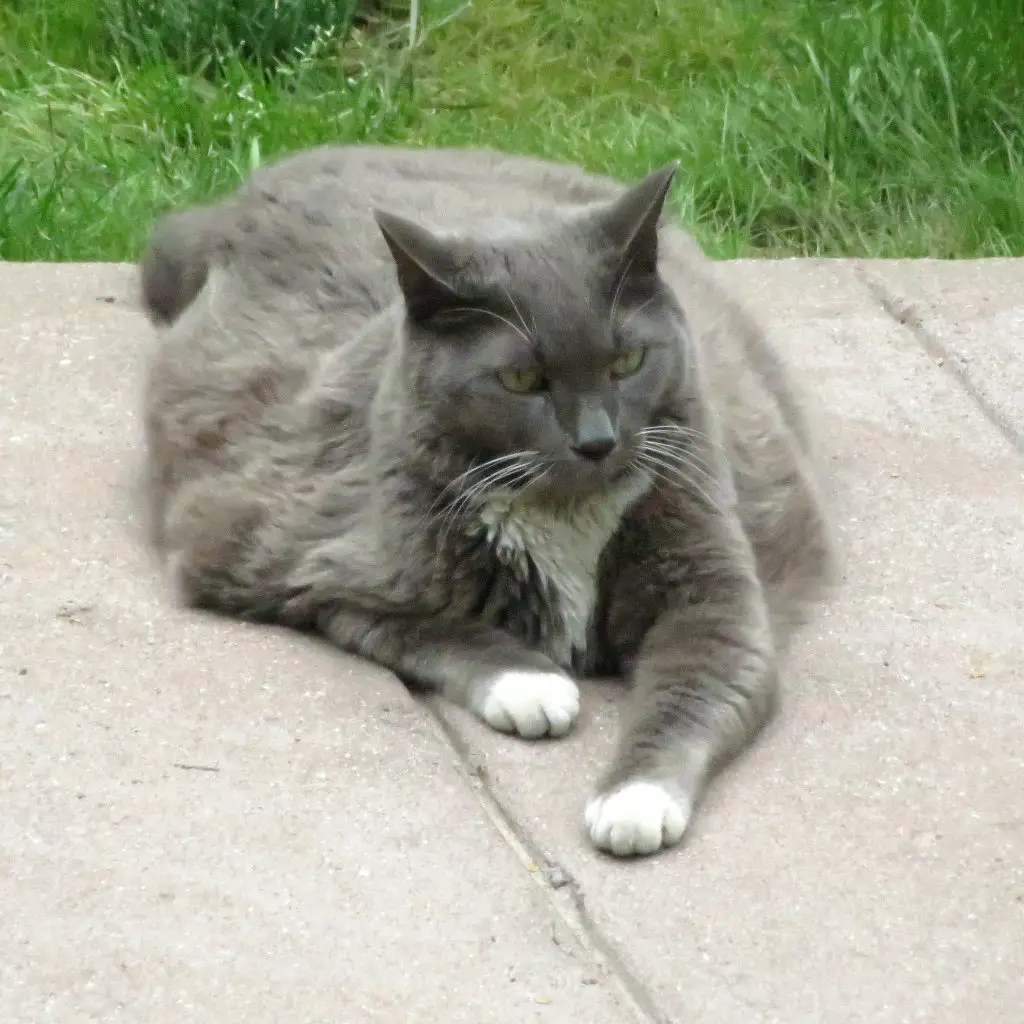
Bleeding in a pregnant cat with no kittens being delivered could be due to complications such as early contractions, miscarriage, or other health issues, and it warrants immediate veterinary attention.
Early Contractions and Labor
In my veterinary practice, I’ve encountered situations where a pregnant cat was bleeding but not delivering kittens. This is typically not a normal part of the birthing process and can often indicate a problem like early contractions or labor. These can be triggered by various factors including bacterial or viral infections, genetic disorders, ovarian cysts, malnutrition, death of a fetus, or hormonal imbalances.
Abnormal Vaginal Discharge
While it’s normal for cats to have a small amount of blood-tinged discharge just before or during labor, any abnormal, bad-smelling vaginal discharge or excessive bleeding at any point in the pregnancy or labor is a cause for concern. In my experience, these signs often indicate a serious complication that requires immediate intervention.
Hemorrhaging
If your pregnant cat is bleeding heavily but no kittens are being delivered, this could be a sign of hemorrhaging. This is a medical emergency and the cat should be taken to a veterinary clinic immediately.
Monitoring Discharge and Bleeding
As a veterinarian, I always advise pet owners to monitor their pregnant cats closely for any changes in vaginal discharge or bleeding. While some discharge is normal, if your cat is bleeding excessively or the discharge has an abnormal color or odor, it’s crucial to seek veterinary care without delay says PetCoach.
Are Cats Affectionate Before Labor?
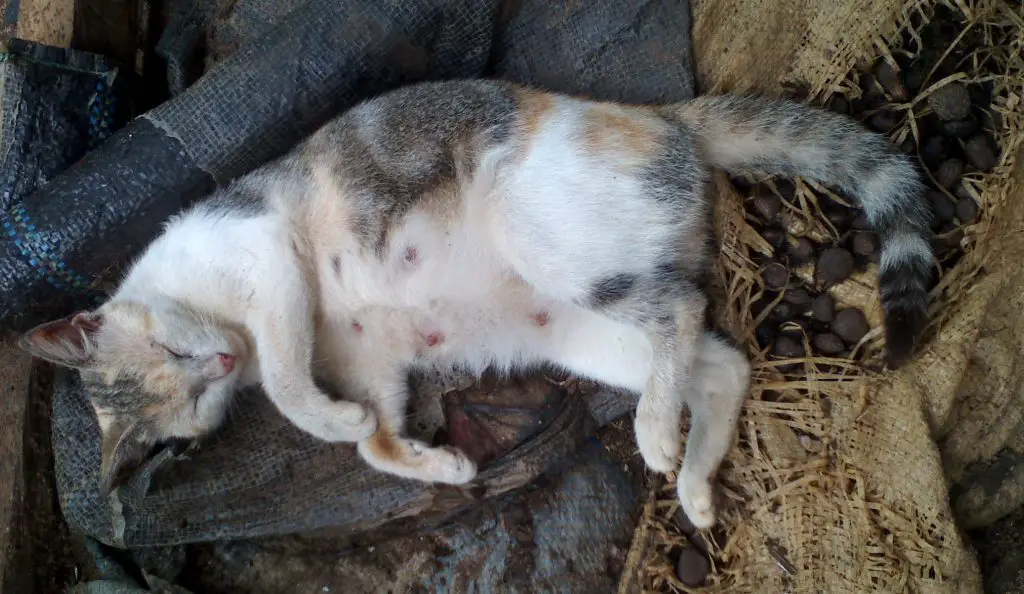
Cats can indeed display increased affectionate behavior before labor as part of their nesting process, although the level of affection can vary greatly depending on the individual cat’s personality and comfort level.
As a veterinarian, I’ve had the opportunity to observe a wide range of behaviors in pregnant cats preparing for labor.
One common behavior is an increase in affectionate actions such as purring, rubbing against people or objects, and seeking out the company of their human caregivers. This is believed to be a part of their nesting process, which is an instinctual preparation for giving birth.
However, it’s important to note that not all cats will display this behavior. Some cats may become more reclusive or anxious as labor approaches, preferring to find a quiet, secluded spot where they can give birth in peace.
This is also completely normal and can depend greatly on the individual cat’s personality and comfort level says The Nest.
Signs That Your Cat’s Going Into Labor
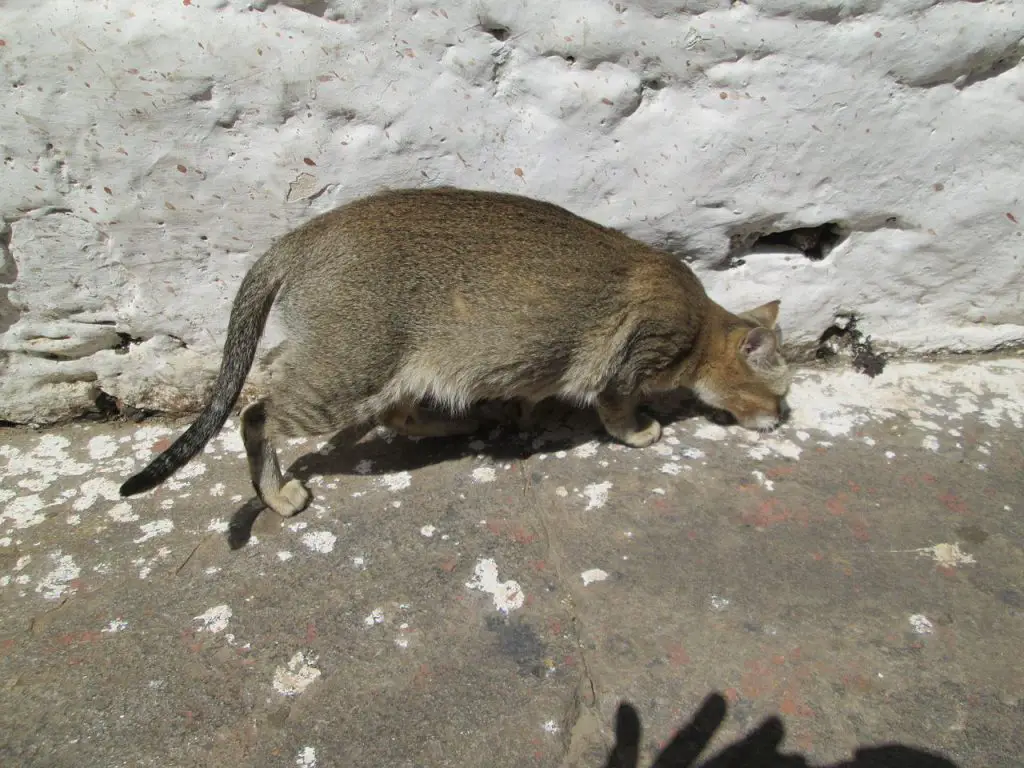
Signs that your cat is going into labor can include increased size of mammary glands, beginning of nesting behavior, decrease in body temperature, behavioral changes, and loss of appetite.
1. Nesting behavior
As any cat owner knows, felines are notoriously independent creatures. They come and go as they please, and rarely ask for help or attention. However, when a cat is about to give birth, she will often start to act differently. She may become more clingy and affectionate and may start ‘nesting’ in preparation for her kittens.
This behavior can be a sign that labor is imminent, and it is important to provide the cat with a safe, quiet place to have her kittens. Once the kittens are born, the mother cat will usually take care of them on her own, but it is important to keep an eye on her and make sure that she is healthy and able to care for her new offspring.
2. Restlessness and pacing
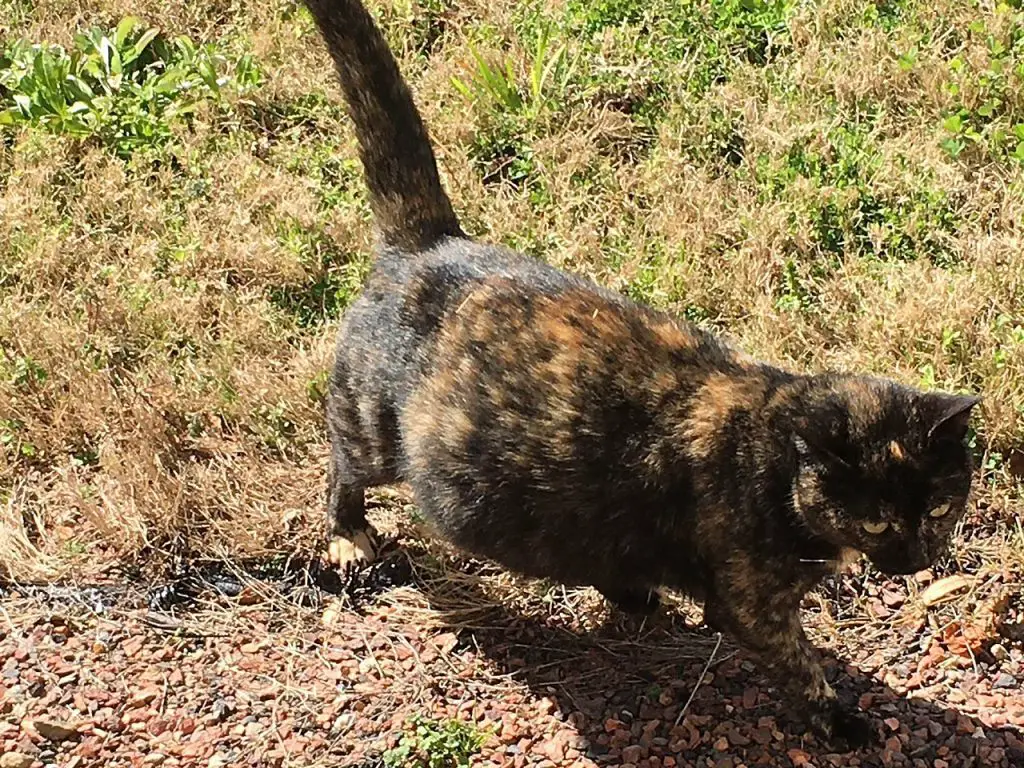
When a cat is approaching labor, she may exhibit certain behaviors that are signs that her body is getting ready for childbirth. One of these behaviors is restlessness and pacing.
The cat may pace back and forth in her nest, or move from one nesting spot to another. She may also meow more than usual, as she seeks comfort from her human companions.
As labor progresses, the cat will become increasingly agitated, and may even cry out in pain. This is normal and is a sign that the birth is imminent. If you see your cat exhibiting these behaviors, it is important to provide her with a quiet, safe place where she can labor in peace.
Do not try to stop her from pacing or crying out, as this could impede the progress of labor. Just be there to offer support and comfort as she brings new life into the world says VCAHospitals.
3. Loss of appetite
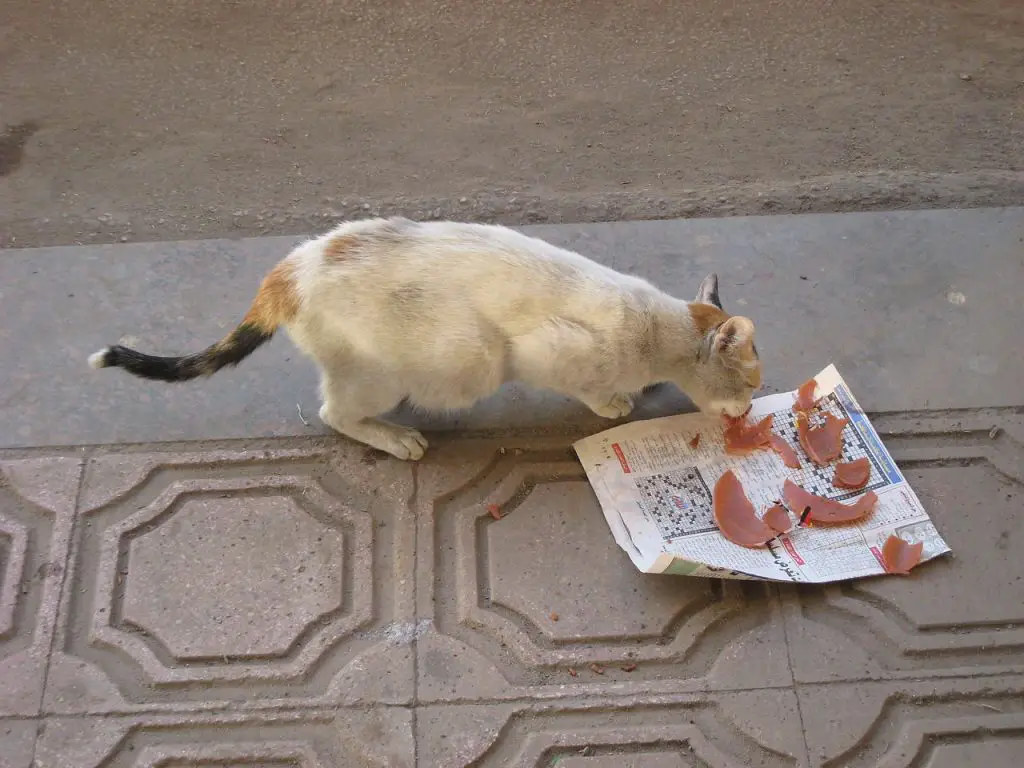
Just like with humans, when a cat is about to give birth it may experience a loss of appetite. This is because they are using all of their energy to prepare for labor and delivery. For some cats, this may just mean that they are a little less interested in food than usual. However, other cats may completely lose their appetite and stop eating altogether.
If your cat falls into the latter category, it’s important to pay close attention. A loss of appetite can be a sign that the cat is going into labor and you will want to be sure that they are properly hydrated. So, offer them small amounts of water throughout the day and contact your veterinarian if their appetite does not return within 24 hours.
4. Licking her abdomen
When a cat is close to giving birth, she will often start to lick her abdomen. This helps to stimulate the flow of blood and loosen the muscles in her uterus, making it easier for her kittens to be born.
Additionally, licking helps to clean the area around the birth canal, preventing infection. Some cats will also lick their owners as a way of asking for help during labor. If you see your cat licking her abdomen, it’s a good idea to keep an eye on her and provide any assistance she may need.
5. Temperature drop
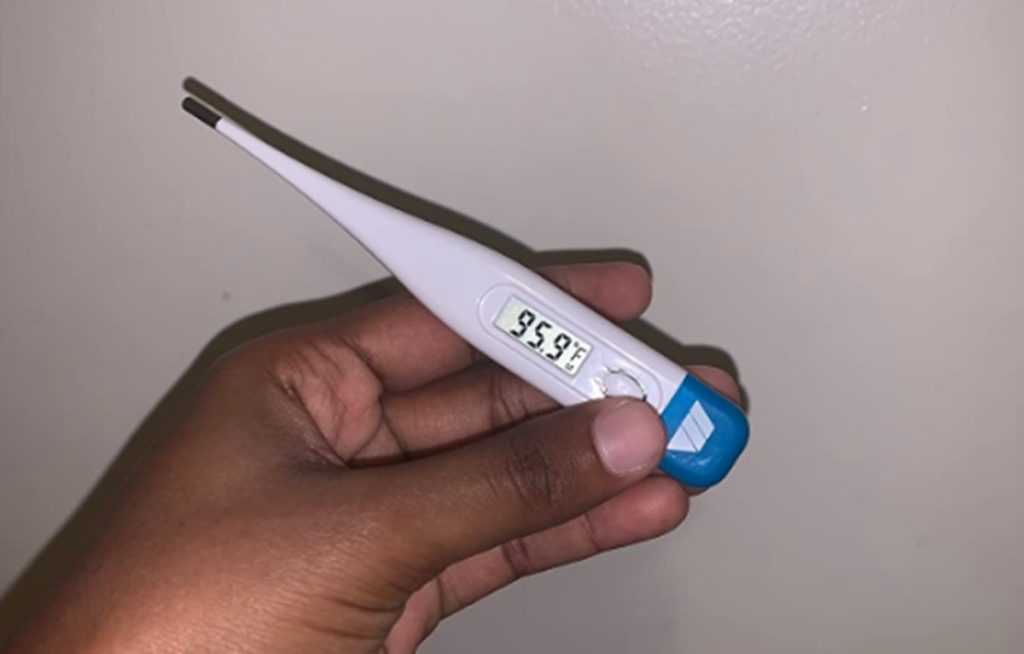
When a cat is about to go into labor, her body temperature will usually drop a few degrees. This drop in temperature is caused by the release of a hormone called prostaglandin, which triggers the onset of labor. As labor progresses, the cat’s temperature will continue to fall, eventually reaching around 99 degrees Fahrenheit.
In addition to a drop in temperature, other signs that a cat is going into labor include nesting behavior and restlessness. If you suspect that your cat is about to give birth, it’s important to contact your veterinarian for guidance on how to best support her during this time.
When To Seek Veterinary Help For Cat In Labor
Veterinary help should be sought for a cat in labor if the first kitten is not delivered within 2 hours after the onset of contractions if your cat has been straining for more than 30 minutes without delivering a kitten, or if there are no signs of labor a few days after the expected due date.
In my professional experience as a veterinarian, I’ve seen many instances where intervention was necessary during a cat’s labor. If the first kitten is not delivered within 2 hours after contractions have begun, this could indicate a problem such as dystocia, or difficult birth, which requires immediate veterinary attention.
Similarly, if your cat has been straining or having contractions for more than 30 minutes without the delivery of a kitten, this can also be a sign of complications. It’s important to note that these contractions are usually quite visible – you’ll likely see your cat’s abdomen tensing and she may show signs of discomfort.
Additionally, if your cat doesn’t show any signs of going into labor a few days after her expected due date, it’s important to contact your vet. Cats’ gestation periods can vary slightly, but if there’s a significant delay it could suggest a problem.
Furthermore, always keep your vet’s contact information handy, including their out-of-hours phone number. Remember, labor can often happen during the night or at inconvenient times, so knowing who to call in case of an emergency is crucial.
As a general rule, if you are at all concerned about your cat during her labor, it’s better to err on the side of caution and seek veterinary advice. Your vet can guide you through the process and provide reassurance or necessary medical intervention.
FAQs
Q: How can I tell if my cat is pregnant?
A: There are several signs that may indicate that your cat is pregnant. These include a swollen abdomen, nipple enlargement, and pinkish color, increased appetite, behavior changes, and nesting behavior.
Q: How long is a cat’s pregnancy?
A: A cat’s pregnancy typically lasts around 63-65 days on average. However, it is not uncommon for pregnancies to range between 58-70 days.
Q: Should I be present during my cat’s labor?
A: While it is important to monitor your cat during labor, it is generally recommended to allow your cat to give birth in a quiet, private, and comfortable space. Some cats may become anxious or aggressive if they feel their privacy is being invaded. If you have concerns, it’s best to consult with your veterinarian.
Q: How many kittens can a cat have?
A: The number of kittens in a litter can vary depending on the cat’s breed and individual factors. On average, cats can have between 3 to 5 kittens in a litter, but it is not uncommon for some to have as few as 1 or as many as 9 or more.
Q: What should I do if my cat is having difficulty giving birth?
A: If you suspect that your cat is having difficulty giving birth or if she has been in active labor for more than two hours without producing a kitten, it is important to seek immediate veterinary assistance. This could be a sign of complications that require medical intervention.
Q: Can I spay my cat while she is pregnant?
A: Spaying a pregnant cat is generally not recommended, as it can pose additional risks to the cat and her unborn kittens. It is best to consult with your veterinarian for advice on the best course of action.
Q: What should I do if my cat gives birth to a stillborn kitten?
A: It can be distressing if your cat gives birth to a stillborn kitten. It is important to allow your cat the opportunity to grieve for a short time, but if she appears distressed or if there are any signs of complications, it is best to consult with your veterinarian for guidance.
Q: How soon can a cat get pregnant again after giving birth?
A: Cats can go into heat and get pregnant as early as a week or two after giving birth. To prevent unintended pregnancies, it is recommended to spay your cat if you do not wish for her to become pregnant again.
Conclusion and final thoughts
In conclusion, understanding the signs and behaviors of a pregnant cat can be crucial in ensuring a smooth delivery and healthy kittens.
Bleeding before giving birth is not a common occurrence in cats, but it is still important to monitor your cat closely during this time.
If you do notice any abnormal bleeding or discharge, it is best to consult with your veterinarian for further guidance.




